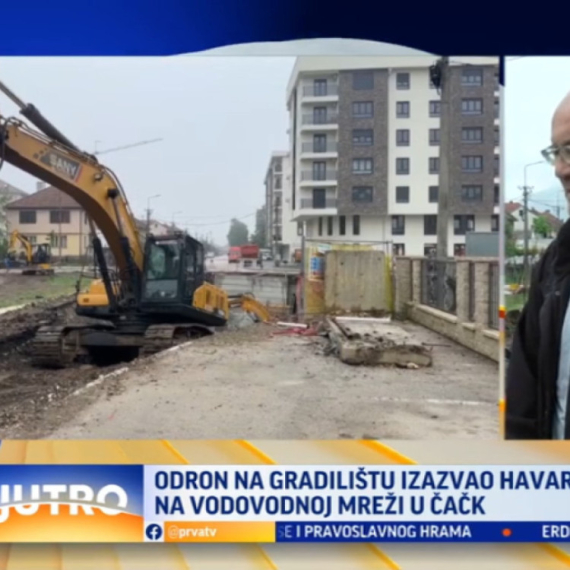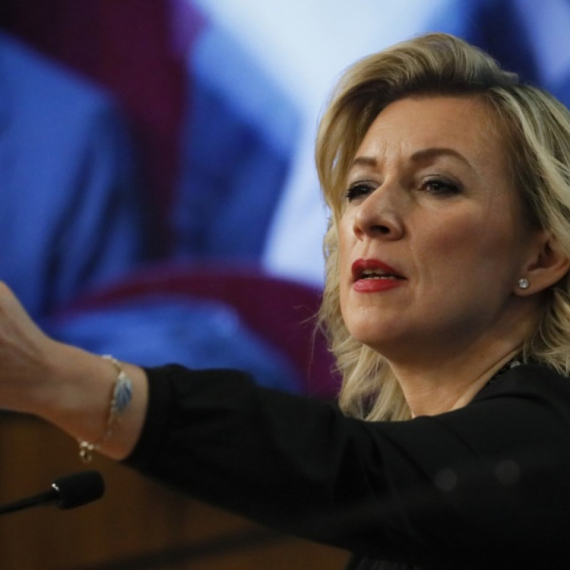PM "not optimistic" ahead of new round of talks
Because of Priština's opposition to executive powers for a community of Serb municipalities, it is uncertain that this institution will be established at all.
Thursday, 28.03.2013.
19:22

BELGRADE Because of Pristina's opposition to executive powers for a community of Serb municipalities, it is uncertain that this institution will be established at all. This is according to Prime Minister Ivica Dacic, who attended a question time session of the Serbian parliament on Thursday. PM "not optimistic" ahead of new round of talks "With each new (round) of negotiations on Kosovo Serbia's negotiating position is weakening," he also stated. Dacic told reporters in parliament that "not even the Ahtisaari plan is being implemented in Kosovo today", when it comes to the rights of Serbs - and that even this plan "would have to be fought for". "Serbia is ready to make a deal, that is not disputed, but the Serbs in Kosovo and Metohija should have a community with powers that be will not be of a ceremonial nature," Dacic said in answer to a question of an SPO party MP, who asked about the negotiations in Brussels. The prime minister said that Pristina has no control over northern Kosovo and that Serbia does not want the issue to be resolved in accordance with the laws of Kosovo, but believes that a special political arrangement is necessary instead. "It takes a special political agreement and a plan to solve the problem, I have not heard of any other region such as the north (of Kosovo) that is being dealt with by the whole international community," said Dacic. The prime minister added that "nothing happened that would change the position of Belgrade nor has anything been accepted that is different from the previous (position)". Dacicstated that the government had only been working to implement previous agreements, and that the only new agreement concerned "the establishing of liaison officers". According to him, the Serbian government is united in its policy. "And that means that we want to solve the Kosovo problem, not by handing it over. We want to resolve it because we feel that it should not be left to be dealt by future generations," said Dacic. As he pointed out, First Deputy Prime Minister Aleksandar Vucic has participated in the negotiations, and no decision has been made without consultations with him. "Between myself and him - as prime minister and as president of the largest party - there is unity on this issue and it will remain so after April 2," Dacic said. "We will make our decisions either together or not at all, because this is not a personal or individual matter, it is not only our personal future that depends on it, but the future of the state, the nation, and perhaps of future generations," said the Serbian premier. Dacic also noted that he was conducting the Brussels talks because this was suggested by President Tomislav Nikolic, and that "for that reason, everyone bears the responsibility". The prime minister reiterated that he was not optimistic about the possibility that an agreement would be reached with Pristina, and explained: "This is because I do not see among the decision-makers a strategic ally that a deal can be made with, that would be in the interest of the Serbian people - but also because no one is forcing Pristina to a compromise." "The fact that I am not optimistic does not mean that we will not be insisting until the last moment on compromises," Dacic told MPs. Serbia is willing to reach a compromise, but it can not give more that what is already offered, because humiliation is not a solution for Kosovo, and if anyone expects we will back down at the last moment, they are deeply wrong, Dacic added. He then stated that he was "willing to sacrifice his political position and is not interested in elections", as well as that he "never negotiated the independence of Kosovo in Brussels, because he was not given such a mandate - nor was this asked of me". The prime minister said that he did not know how long the round of negotiations scheduled for April 2 would last, but pointed out that "even after Tuesday a solution will be sought". EU's Catherine Ashton, who is acting as mediator in the negotiations Dacic and Hashim Thaci are conducting, "wanted to terminate the talks after the 7th round, but I insisted that they should continue," he revealed. Opposition DSS party MP Slobodan Samardzic asked the prime minister "who gave him the mandate to discuss the status of Serbs in an independent Kosovo". "No matter what solution is to be achieved it should be in accordance with the Constitution and laws of Serbia, but you did not adhere to the Constitution and (UNSC) Resolution 1244 in the negotiations so far, you adhered to the Ahtisaari Plan and Kosovo laws," Samardzic accused the prime minister, who responded by saying that his negotiating mandate was " given to him by the Serbian parliament". Dacic then denied that during the previous round of the negotiations in Brussels, the Serbian delegation was offered "a paper that is now being speculated about publicly". "That paper does not exist in legal terms, it is an attempt to summarize what had been agreed. That paper is absolutely nonsensical, it does not contain the essential things. It is an attempt to agree at least on some framework," said Dacic. The prime minister stressed that the Serbian negotiators "have no reason to hide what is required of them", and that "there will be no secret papers, or secret commitments to be undertaken". Dacic went on to specify that he asked for the issues of electricity and telecommunications to be included on the agenda, but that "no one was bringing up these issues". The agreed exchange of liaison officers, as well as the creation of the Fund for the Development of Northern Kosovo, has not yet happened, Dacic noted. (Tanjug, file) No elections, top officials to meet on Friday Prime Minister Ivica Dacic has said there will be no elections in Serbia regardless of the outcome of the talks with Pristina in Brussels and he announced a new meeting of the country's top officials on Friday to discuss the talks. "Elections are called when there are problems within the parliamentary majority and when there is a serious crisis in the society that can only be resolved with elections. I do not see why there should be elections regardless of whether or not an agreement is reached," Dacic told the parliament responding to MP questions. Opposition Liberal Democratic Party MP Cedomir Jovanovic asked Dacic if the government existed and if there would be elections, and Dacic responded that he had a particularly hard time understanding why there should only be a parliamentary election and no presidential. Serbia is in a deep economic crisis and cannot get out of it by making small steps, but only through strong economic development, Dacic also said in parliament on Thursday, stressing unemployment as the biggest problem. "We are in a deep crisis, far behind other countries in the region. Without going into the discussion of whose fault that is, I have to say that without a fast, strong rate of economic growth, we cannot take steps to improve the standard of living and employment," he told MPs "Unemployment is a particular problem and poses the number one issue in the country," according to the prime minister. B92 Beta Tanjug
PM "not optimistic" ahead of new round of talks
"With each new (round) of negotiations on Kosovo Serbia's negotiating position is weakening," he also stated.Dačić told reporters in parliament that "not even the Ahtisaari plan is being implemented in Kosovo today", when it comes to the rights of Serbs - and that even this plan "would have to be fought for".
"Serbia is ready to make a deal, that is not disputed, but the Serbs in Kosovo and Metohija should have a community with powers that be will not be of a ceremonial nature," Dačić said in answer to a question of an SPO party MP, who asked about the negotiations in Brussels.
The prime minister said that Priština has no control over northern Kosovo and that Serbia does not want the issue to be resolved in accordance with the laws of Kosovo, but believes that a special political arrangement is necessary instead.
"It takes a special political agreement and a plan to solve the problem, I have not heard of any other region such as the north (of Kosovo) that is being dealt with by the whole international community," said Dačić.
The prime minister added that "nothing happened that would change the position of Belgrade nor has anything been accepted that is different from the previous (position)".
Dačićstated that the government had only been working to implement previous agreements, and that the only new agreement concerned "the establishing of liaison officers".
According to him, the Serbian government is united in its policy.
"And that means that we want to solve the Kosovo problem, not by handing it over. We want to resolve it because we feel that it should not be left to be dealt by future generations," said Dačić.
As he pointed out, First Deputy Prime Minister Aleksandar Vučić has participated in the negotiations, and no decision has been made without consultations with him.
"Between myself and him - as prime minister and as president of the largest party - there is unity on this issue and it will remain so after April 2," Dačić said.
"We will make our decisions either together or not at all, because this is not a personal or individual matter, it is not only our personal future that depends on it, but the future of the state, the nation, and perhaps of future generations," said the Serbian premier.
Dačić also noted that he was conducting the Brussels talks because this was suggested by President Tomislav Nikolić, and that "for that reason, everyone bears the responsibility".
The prime minister reiterated that he was not optimistic about the possibility that an agreement would be reached with Priština, and explained:
"This is because I do not see among the decision-makers a strategic ally that a deal can be made with, that would be in the interest of the Serbian people - but also because no one is forcing Priština to a compromise."
"The fact that I am not optimistic does not mean that we will not be insisting until the last moment on compromises," Dačić told MPs.
Serbia is willing to reach a compromise, but it can not give more that what is already offered, because humiliation is not a solution for Kosovo, and if anyone expects we will back down at the last moment, they are deeply wrong, Dačić added.
He then stated that he was "willing to sacrifice his political position and is not interested in elections", as well as that he "never negotiated the independence of Kosovo in Brussels, because he was not given such a mandate - nor was this asked of me".
The prime minister said that he did not know how long the round of negotiations scheduled for April 2 would last, but pointed out that "even after Tuesday a solution will be sought".
EU's Catherine Ashton, who is acting as mediator in the negotiations Dačić and Hashim Thaci are conducting, "wanted to terminate the talks after the 7th round, but I insisted that they should continue," he revealed.
Opposition DSS party MP Slobodan Samardžić asked the prime minister "who gave him the mandate to discuss the status of Serbs in an independent Kosovo".
"No matter what solution is to be achieved it should be in accordance with the Constitution and laws of Serbia, but you did not adhere to the Constitution and (UNSC) Resolution 1244 in the negotiations so far, you adhered to the Ahtisaari Plan and Kosovo laws," Samardžić accused the prime minister, who responded by saying that his negotiating mandate was " given to him by the Serbian parliament".
Dačić then denied that during the previous round of the negotiations in Brussels, the Serbian delegation was offered "a paper that is now being speculated about publicly".
"That paper does not exist in legal terms, it is an attempt to summarize what had been agreed. That paper is absolutely nonsensical, it does not contain the essential things. It is an attempt to agree at least on some framework," said Dačić.
The prime minister stressed that the Serbian negotiators "have no reason to hide what is required of them", and that "there will be no secret papers, or secret commitments to be undertaken".
Dačić went on to specify that he asked for the issues of electricity and telecommunications to be included on the agenda, but that "no one was bringing up these issues".
The agreed exchange of liaison officers, as well as the creation of the Fund for the Development of Northern Kosovo, has not yet happened, Dačić noted.
No elections, top officials to meet on Friday
Prime Minister Ivica Dačić has said there will be no elections in Serbia regardless of the outcome of the talks with Priština in Brussels and he announced a new meeting of the country's top officials on Friday to discuss the talks."Elections are called when there are problems within the parliamentary majority and when there is a serious crisis in the society that can only be resolved with elections. I do not see why there should be elections regardless of whether or not an agreement is reached," Dačić told the parliament responding to MP questions.
Opposition Liberal Democratic Party MP Čedomir Jovanović asked Dačić if the government existed and if there would be elections, and Dačić responded that he had a particularly hard time understanding why there should only be a parliamentary election and no presidential.
Serbia is in a deep economic crisis and cannot get out of it by making small steps, but only through strong economic development, Dačić also said in parliament on Thursday, stressing unemployment as the biggest problem.
"We are in a deep crisis, far behind other countries in the region. Without going into the discussion of whose fault that is, I have to say that without a fast, strong rate of economic growth, we cannot take steps to improve the standard of living and employment," he told MPs
"Unemployment is a particular problem and poses the number one issue in the country," according to the prime minister.
















Komentari 8
Pogledaj komentare